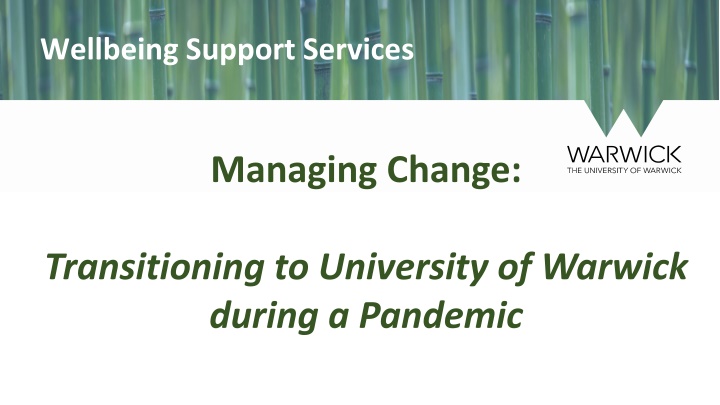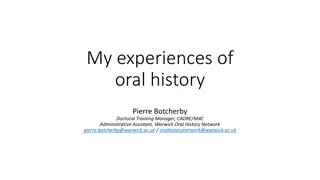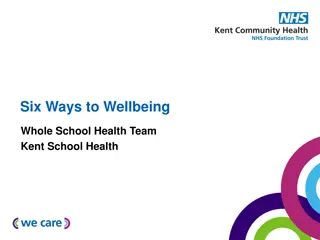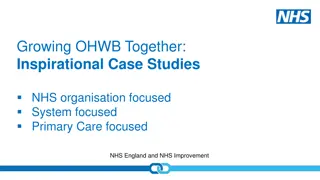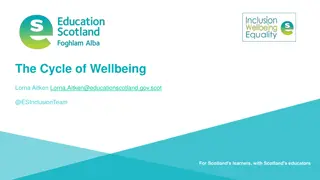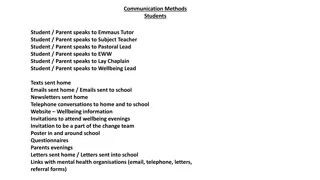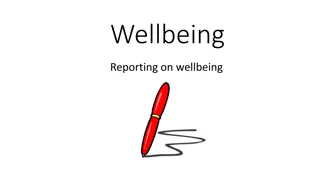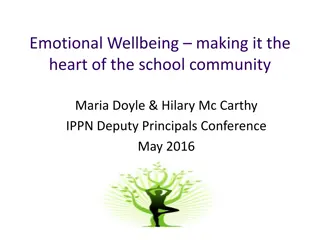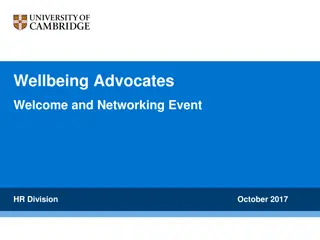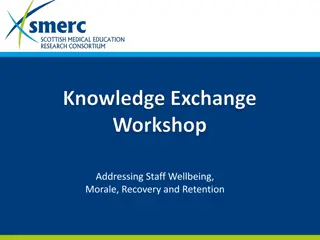Navigating Change and Wellbeing Support at University of Warwick
This session aims to assist students at University of Warwick in transitioning to a new way of university life amidst the pandemic. It covers managing transitions, expectations for Term 1, preparation tips, wellbeing support services, and approaches to handling change and uncertainty. Emphasizing the importance of relaxation, healthy eating, quality sleep, exercise, and understanding one's emotions, the session provides valuable insights to help students thrive during these challenging times.
Download Presentation

Please find below an Image/Link to download the presentation.
The content on the website is provided AS IS for your information and personal use only. It may not be sold, licensed, or shared on other websites without obtaining consent from the author.If you encounter any issues during the download, it is possible that the publisher has removed the file from their server.
You are allowed to download the files provided on this website for personal or commercial use, subject to the condition that they are used lawfully. All files are the property of their respective owners.
The content on the website is provided AS IS for your information and personal use only. It may not be sold, licensed, or shared on other websites without obtaining consent from the author.
E N D
Presentation Transcript
Wellbeing Support Services Managing Change: Transitioning to University of Warwick during a Pandemic
Aims of this Session This session is for all students, new and returning, from Undergraduate to PGT and PGR level, to help with the transition to a new way of University life. The changes to University life in the current situation Foundations of Wellbeing Managing transitions The Change Cycle
Expectations for Term 1 We do not know for certain what teaching or social life on campus will look like this year, as things could change with government guidelines. For more information remember to look on our Student FAQ Page on Insite this is being updated regularly: https://warwick.ac.uk/coronavirus/students Your department will also be able to provide you with up to date information regarding your course. In terms of Wellbeing Support we remain open and running as usual. We will be going over some more information around how you can access the service and what support will be available later in the session.
Transitions Preparation is key to help with managing transitions, especially being mindful of the current changes due to the Coronavirus pandemic. Some things to think about may be: Plan how to stay in touch with family and friends back home if you are moving away fror the first time See if there are any groups online for your course or halls. If returning, try to plan some virtual and socially distant meet ups with friends Whether new or reutrning - research societies and what events may be happening in person or online during the initial few weeks and remainder of Term 1
Take time out to relax and reduce your stress levels Eat Eat Well Well Take time to stop and eat regular, healthy meals. Your body and brain need fuel Read, chat, listen to music or podcasts, meditate Sleep Sleep Well Well Foundations of Good Wellbeing Relax Relax Exercise reduces stress, makes you feel better, think more clearly and helps you sleep well Sleep aids memory, information recall and good physical and mental health Exercise Exercise
How to Approach Change When faced with change or uncertainty, it can help to take some time to think about your emotions. We often focus on the situation and what might be out of our control but are not always mindful of how this is making us feel. When we understand how we are feeling, we are often better able to help ourselves. If we know we are stressed, then we may be more mindful of taking breaks. If we are feeling sad, then we may want to speak to someone about how we feel.
Processing Transition Fear Gradual Acceptance Guilt Happiness Moving Forward Threat Anxiety Depression/Low Mood
Impacts of Stress and Anxiety Feeling Feeling tired, low tired, low energy, restless energy, restless Feeling Feeling overwhelmed overwhelmed Change in Change in sleeping patterns sleeping patterns Transition Change Stress/Anxiety Difficulty Difficulty concentrating concentrating Changes to Changes to appetite appetite Feeling more Feeling more irritable/snappy irritable/snappy
Strategies to Manage Stress and Anxiety Remember to look after the basics - Make sure you are getting enough sleep, eating a balanced diet, and getting regular physical activity. These are the basics, but they are important and are often forgotten when we are feeling anxious or stressed. Focus on your breathing Breathe in through your nose for 4 seconds, hold for 4 seconds, and exhale through your mouth for 4 seconds. Do this as long as you need to. It will help to physically relax your body, and to calm your mind. Take some time out try mindfulness, meditation, reading, going for a walk or listening to a podcast/music. Breaks are just as important as time spent working, otherwise we burn out.
Check Your Thought Patterns During times of our change, our minds can often focus just on the negatives, assuming the worst or taking feelings as facts. It can be helpful to check your thoughts during times of change and transitions, to limit this happening. What information might help me to cope better with this transition? Is there another way to look at this? Might there be an opportunity here? Are there at least some parts of this change that I can control? If you take the time to consider your thought patterns, you may find some thoughts that you can change or look at in different ways. What advice would I give to a friend? Ask yourself questions such as ..
Control what we can and let go of what we cannot Also try to take a minute and examine what you do have control over . You cannot control the current restrictions in place But you can control how you respond to them You can plan how to best spend your time You can make the most of what you can do You cannot control the future and there are still uncertainties You can make the most of the present moment with what opportunities available to you But you can look after your wellbeing to help cope with this You can practice stress and anxiety management
Building Resilience Find a balance in your life we all need balance between routine, necessary and pleasurable activities. Connect with others we are social beings! Make the most of social events, virtual or in person, to stay connected. Practice acceptance acknowledging what is in your control and learning to let go of what is not.
Support Available At University Wellbeing Support Services Student's Union Advice Centre Residential Life Team International Office Your Personal Tutor Campus Security Campus Health Centre Chaplaincy
Clubs and Societies Visit https://www.warwicksu.com/welcome-week/ to see information on Welcome Week and other Student Union Events Visit https://www.warwicksu.com/societies-sports/ to find out all about the Sports Clubs and Societies
Register to Togetherall using your Warwick email to get access to the entire site and all resources
Wellbeing Support Services Wellbeing Support Services offer brief consultations as a chance for students to meet with a wellbeing adviser for a brief initial discussion around what it is they are looking for support with, and what the best next steps may be. Brief consultation sessions run from 10am to 3pm Monday to Friday. Students can submit an enquiry via the Wellbeing Portal and join a virtual queue to speak with an adviser via Microsoft Teams. Further 1:1 support is currently being offered via video, telephone and email depending on the service being accessed. See our website for: More online masterclasses Self-help resources Regular Skills Sessions Visit https://wellbeing.warwick.ac.uk/ to access the Wellbeing Portal
Wellbeing Support Visit https://warwick.ac.uk/services/wss to view our website and for further information
